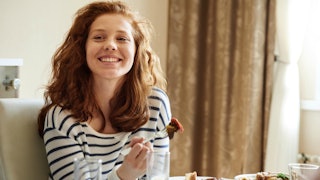Raising Children Who Give A Damn

John le Carré dedicated his book The Constant Gardener to Yvette Pierpaoli, a humanitarian who devoted her life to helping refugees. The dedication read: “To Yvette Pierpaoli, who lived and died giving a damn.”
Yvette was the mother-in-law of Pascal Lemaitre, my collaborator on the recent picture book, Come with Me. We dedicated our book to Yvette too. It was she who said, “Though at the level of the individual our actions may be light as a cloud, united they can change the color of the sky.”
Pascal told me that Yvette wanted more than anything else to be fully alive, and that she was driven by passion. At the same time, she was totally devoted to others because of compassion; from her childhood experience of being rejected by her own family, she understood what it was to be humiliated. To live with others and for others was the meaning of her life. The world was lucky to have her.
As a parent, it is one of my greatest hopes that my children will somehow find a way to follow Yvette’s path of passion and compassion, using whatever gifts they have — and even with Thanksgiving just around the corner, I am thinking back a few weeks to Halloween night, and one of the ways I think children learn empathy.
My youngest is 12, and he plays viola in a youth orchestra. The orchestra is pretty rigorous, and the October 31 practice was not canceled — my son wouldn’t be home till 7:30. A friend of his agreed to wait until he got home to go trick-or-treating.
But when my son got home, the mom of the friend called and said that her son had already gone with some neighborhood kids and was too exhausted to go out again.
The tired viola player was very, very sad. I looked at my husband and he looked at me — both listening to the sound of a boy who’d been passed over by his friend.
It was 8 p.m., a school night, and there weren’t many options.
The doorbell rang. A late trick-or-treater who lived down the street. Not a good friend — but maybe our son could finish his rounds with the child and his dad? The dad said that wouldn’t work as they were heading straight home after our house.
Then I noticed my 14-year-old, a high school freshman, at the kitchen table. “Hey,” I said, “could you ask your brother to go trick-or-treating?”
“I’m doing my homework.”
“There’s a costume in the basement,” I said, keeping my voice soft. “The one I wore last year. You can see out of it, but people can’t see you. And you can put it right over your clothes.”
She agreed to take a look.
In the basement, I started digging for the costume, hoping we could salvage one of his last Halloweens as a kid. I found it, and she put it on. “Do you want to go with me?” she asked him.
He said she was just asking out of pity.
And I told him that sometimes it’s okay to be pitied.
He sat.
“Come on,” she said.
“Okay.”
Returning an hour later, the 14-year-old came into the family room and high-fived me, and the 12-year-old was in good spirits. They’d made up a skit to do together as they went door to door, saying they were identical twins who liked to finish each other’s sentences.
Our story had a happy ending, but they don’t always, and watching our kids get their hearts broken is harder than feeling our own heartbreak. But it is our duty to let them go through it and be grateful that by doing so, we are helping to raise children who will be more likely to “give a damn.”
Hardship and humility helps build empathy, and I’m guessing my son will likely be kinder to the next person he meets who’s been disappointed by a friend or who feels alone or forgotten in some way.
Empathy is defined as the ability to understand and share the feelings of another. And it starts at home, on the tiniest stage, as we allow our children to go through their emotions, with us by their sides.
Which brings me to the picture book I made with Pascal — between the covers of this book is the story of a little girl whose parents don’t panic and allow her to go through the emotions of fear about what is happening in the world, rather than pretend those fears aren’t valid. From there, the girl learns that she can make a difference by going out and connecting with another person, just as my daughter did for my son.
Just as Yvette did for the world.
Just as we can all do, in our own way, this Thanksgiving.
Holly McGhee is the author of the tender-hearted New York Times-bestselling story Come With Me about being kind in the face of fear is the most vital picture book for kids – and adults – of the season.